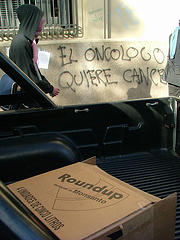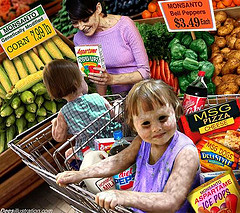 ALLIANCE FOR A RESPONSIBLE, PLURAL, AND UNITED WORLD
ALLIANCE FOR A RESPONSIBLE, PLURAL, AND UNITED WORLD ALLIANCE FOR A RESPONSIBLE, PLURAL, AND UNITED WORLD
ALLIANCE FOR A RESPONSIBLE, PLURAL, AND UNITED WORLD A Take on …
A Take on …In the current global crisis, also suffering, of course, are those producing one of the elements that are essential—along with breathable air and drinkable water—to the survival of humankind: food. Vicent Boix offers us an analysis of one of the ways in which food production, and producers, are being increasingly asphyxiated, a way explicitly planned by the agrochemicals manufacturer Monsanto.
When the global economic crisis broke out in 2008, agriculture had already been suffering recession for a long time. Despite the crisis and a steep slump in the sale of chemical inputs, 2008 was characterized by a spectacular rise in the latter’s prices. This was due to a variety of factors: an increase in the value of oil, dollar mobility, the crisis in the USA, etc. Nevertheless, there is data that suggests other, more corporate and down-to-earth types of causes.
In the midst of the financial meltdown, Monsanto makes a commitment to higher profits
In February 2008, Monsanto projected for that year an increase in gross profit from the sale of Roundup, expected to reach between USD 1.3 and 1.4 billion, driven by higher sales volumes and selling prices worldwide.
The corporation was clearly predicting that at least part of the increase in its income would come from a rise in the sale price of the product. This fact checks out when analyzing a financial report published on April 2 of this year on the sales, prices, and gross benefit of Roundup and other glyphosate-based herbicides:

If the price of oil had already begun to go down in mid-2008, then why did the price of glyphosate continue to rise that year, even with a fall in the volume of sales? As for its business as a whole, Monsanto states that it is committed to double its gross profit, from USD 4.2 in 2007 to 9.75 billion in 2012. [1] Quite a show of trade acrobatics in years that have brought about a crisis in food prices, an energy crisis, and a global economic crisis! All of this, steeped in a structural crisis of small-scale agriculture marked by a patent—in some cases crippling—decline in farmers’ profit margins: Does this give a pretty good illustration of who stands to gain from the upsurge in the price of agrochemicals?
Out on the farm, being hungry just leads to hunger
 At the end of the day, not everyone suffers from the crises. What for some is a financial binge is one more turn of the screw for others. Agrochemicals can represent nearly 25% of a farmer’s total costs (depending, of course, on the type of crop). This is why an inflated increase has negative repercussions on a battered agricultural economy. In Spain, according to data from the farmers’ and breeders’ organizations coordination Coordinadora de Organizaciones Agrarias y Ganaderas (COAG), the consumers’ union Unión de Consumidores de España (UCE), and the housewives’, consumers’, and users’ confederation Confederación Española de organizaciones de amas de casa consumidores y usuarios (CEACCU), the rise in the prices of fertilizers brought about additional expenses amounting to more than EUR 700 million in 2008.
At the end of the day, not everyone suffers from the crises. What for some is a financial binge is one more turn of the screw for others. Agrochemicals can represent nearly 25% of a farmer’s total costs (depending, of course, on the type of crop). This is why an inflated increase has negative repercussions on a battered agricultural economy. In Spain, according to data from the farmers’ and breeders’ organizations coordination Coordinadora de Organizaciones Agrarias y Ganaderas (COAG), the consumers’ union Unión de Consumidores de España (UCE), and the housewives’, consumers’, and users’ confederation Confederación Española de organizaciones de amas de casa consumidores y usuarios (CEACCU), the rise in the prices of fertilizers brought about additional expenses amounting to more than EUR 700 million in 2008.
In Argentina, famous for its “agriculture miracle,” this year’s profit margins for certain crops could decrease drastically, partly due to the increase in the price of inputs. You might just say that out on the farm, being hungry just leads to hunger. Costs go up on one side while income goes down on the other. According to data from the Unió de Llauradors i Ramaders, tangerines in the Valencia region this season were paid EUR 0.14/kilo, when the minimum price to cover costs had been estimated at 0.24. According to the food price index per origin and destination provided by the COAG, the UCE, and the CEACCU, farmers in Spain now receive about 20% of what consumers pay for a product. This supposes downright abuse and slams agriculture into death row.
Everything more and more concentrated in fewer and fewer hands
 Just as in food distribution, which grows more concentrated by the day, a few companies manufacturing and selling agrochemicals have a monopoly that puts them in the privileged position of setting the prices. In countries like Mexico, the denationalization of the oil industry brought an end to the development of cheap fertilizers. Now, thousands of farmers have to buy them from multinational corporations at higher prices. Transgenics, in this context, generate more dependence on these chemical products, hence greater benefits for Monsanto and company.
Just as in food distribution, which grows more concentrated by the day, a few companies manufacturing and selling agrochemicals have a monopoly that puts them in the privileged position of setting the prices. In countries like Mexico, the denationalization of the oil industry brought an end to the development of cheap fertilizers. Now, thousands of farmers have to buy them from multinational corporations at higher prices. Transgenics, in this context, generate more dependence on these chemical products, hence greater benefits for Monsanto and company.
Generally speaking, the Machiavellian premonitions that the social left has been denouncing for years are coming true. Neoliberal globalization, with the help of certain technologies, has been progressively concentrating land, inputs, and seeds, and the food trade, distribution, and sale in fewer and fewer hands. For some people, this rhymes with competitiveness. For the huge majority, it means the end.
![]() Illustrations under Creative Commons license:
Illustrations under Creative Commons license:
![]() Monsteranto, by Rainmaker
Monsteranto, by Rainmaker
![]() Roundup, el oncólogo quiere cáncer, by Libertinus Yomango
Roundup, el oncólogo quiere cáncer, by Libertinus Yomango
![]() Genetically Modified Humans, by David Dees
Genetically Modified Humans, by David Dees
[1] Monsanto 2008 Annual Report, p. 3
URL : www.alliance21.org/2003/article3400.html
PUBLICATION DATE: 10 June 2009